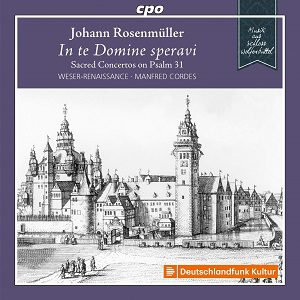
Wesser-Renaissance Bremen Ideally Suited to Johann Rosenmüller
In the 1650s “The Amphion of his Century” was an up-and-coming musician in Leipzig. He was poised to take over as the cantor of St. Thomas’ in 1653 (a position J.S. Bach would hold years later). Suddenly everything changed. A scandal forced Johann Rosenmüller to leave in haste.
While it was a setback for his career, it proved to be a boon for Baroque music in Germany. Rosenmüller went to Italy. when he returned, his music — a blend of Italian and German traditions — would become the model for Telemann, J.S. Bach, and Handel.
Rosenmüller landed at St. Mark’s in Venice, and taught at the Ospedale della Pietà — a post-Vivaldi would later hold. He fell under the influence of Legrenzi and Corelli. In 1682 Rosenmüller could safely return to Germany, entering the employ of Anthony Ulrich of Brunswick-Wolfenbüttel. It was there that his music was collected, preserving it for future generations.
This release features Rosenmüller’s settings of Psalm 30 and 31. There’s great variety in Rosenmüller’s treatments. There are settings for antiphonal choirs, solo arias, duets, and more. Some of the passages reminded me of Gabrieli, particularly in the way he uses voices to answer each other. I could also hear traces of Corelli, and perhaps some Schutz — especially in the choral passages.
Some of the influences may be apparent, Rosenmüller’s music is not derivative. This is music that preserves the Lutheran ideal of directness. While artfully set, the text is never obscured by the music. And it also embraces the Italian notion of melodiousness. At times the melodies seem to simply float above the basso continuo as a feather in the breeze.
The Wesser-Renaissance Bremen seem ideally suited to this music. Five vocalists and seven instrumentalists deliver very intimate performances. The recording is exceptionally well-done. There’s just a hint of ambiance, with the voices in the front of the sound field. It makes the ensemble sound transparent and lets the sung texts come through with great clarity.
Johann Rosenmüller: In te Domine speravi
Sacred Concertos on Psalm 31
Weser-Renaissance Bremen
Manfred Cordes, director
CPO 555 165–2

